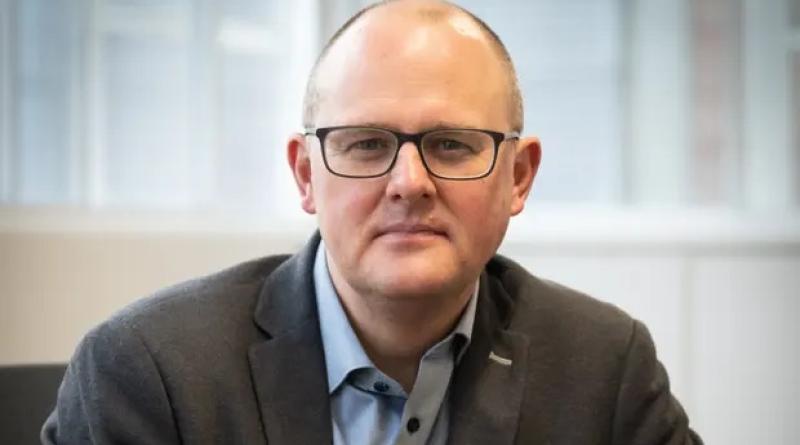UK lagging behind in global race to decarbonise, says TUC leader

The UK is in danger of being left behind in the global race to decarbonise the economy with potentially disastrous consequences for jobs and communities, according to the TUC’s general secretary.
In an interview, Paul Nowak said the UK was “limping towards a green future” and he called for a “national collective effort” involving employers, workers and the government to ensure a quick and fair transition to a net zero economy.
“All of our unions are signed up to delivering net zero … from schools to hospitals to the steel industry, our members are working day in, day out to make sure this transition happens and is done in a way that is fair and just,” he said.
The role of trade unions in the UK’s net zero transition hit the headlines this month when leader of the GMB, Gary Smith, criticised Labour’s plan to ban oil and gas expansion, saying it was “naive”.
Smith said the party had “got it wrong” and that his members had been promised tens of thousands of jobs in renewable energy “time and time again” but that they “simply have not emerged”.
Nowak declined to be drawn into the row but said it underlined the need for workers – including those in the oil and gas industry – to have a seat at the table “to shape concrete plans for the future”.
He said change “must be done with people rather than to them” if the country was to avoid a rerun of the devastation caused by the deindustrialisation of the 1980s.
“Growing up in Merseyside in the 1980s, I saw what happens when you don’t manage industrial transition effectively,” he said. “Right across Britain’s industrial heartlands we can see the scarring effect of long-term unemployment and cities and towns are still recovering. We are absolutely clear that we have to get to net zero in a way that supports and creates good quality jobs and gives people a sense of agency in how that transition can be delivered.”
Nowak, who took up the post of general secretary in January, grew up in Merseyside and worked as a call centre operator, a hotel night porter and a supermarket worker before becoming a dedicated trade unionist.
He said an ideological aversion to state action meant the current Tory government – unlike its counterparts in the US and Europe – was failing to set out a coherent strategy to decarbonise, instead leaving the issue to fractured, market-led interventions.
“I just don’t think you can leave these huge industrial transformations to the market and think everything is just going to work out … We are limping towards a green future rather than having a government with a real sense of purpose,” he said.
Pressure for action on the climate in the UK in recent years has come from direct action campaigns, protests and youth strikes – from Extinction Rebellion to Just Stop Oil. In recent months, some trade unions have made common cause with climate campaigners, with both groups arguing that the cost of living crisis and ecological breakdown have the same root cause – an economic system that exploits natural resources and people for the benefit of a wealthy few.
Nowak said unions “can and do work together” with climate campaigners, with both groups prioritising “a positive long-term future for everyone” over short-term private profits for a few.
But he acknowledged there were differences of politics and outlook between the two, with “union activity focused on the workplace”.
“Our credibility is rooted in those millions of union members whose work will be affected by the transition to net zero,” he said. “So constructive dialogue between us is important where we have differing views from some climate campaigners, such as our view that there is an important future role for nuclear energy.”
Nowak is confident that the trade union movement has the capacity and expertise to ensure a just transition – if workers are given a seat at the table from the start.
Nowak said unions “can and do work together” with climate campaigners, with both groups prioritising “a positive long-term future for everyone” over short-term private profits for a few.
But he acknowledged there were differences of politics and outlook between the two, with “union activity focused on the workplace”.
“Our credibility is rooted in those millions of union members whose work will be affected by the transition to net zero,” he said. “So constructive dialogue between us is important where we have differing views from some climate campaigners, such as our view that there is an important future role for nuclear energy.”
Nowak is confident that the trade union movement has the capacity and expertise to ensure a just transition – if workers are given a seat at the table from the start.
But he said there were signs that Labour was developing a more coherent net zero strategy, linking a new deal for workers to trade policies and industrial strategy. Starmer is expected to make highly skilled green jobs a central plank of his clean energy pitch later this month, though Labour has been criticised for scaling back plans to borrow £28bn a year to invest in the transition.
Nowak said a successful transition could not be cooked up by politicians in Westminster or business leaders in boardrooms – or even trade union leaders in endless meetings.
“This is not about me or the TUC or a few union leaders. What trade unions bring to the table is a network of tens of thousands of union reps up down the country that can be actively mobilised to help shape what this green future will look like,” he said. “That is a resource that no government should ignore and no employer should ignore.”
cover photo:Paul Nowak: ‘We are limping towards a green future rather than having a government with a real sense of purpose.’ Photograph: Stefan Rousseau/PA





